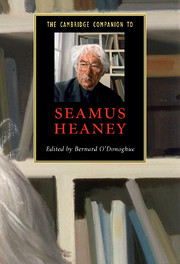Book contents
- Frontmatter
- 1 Introduction
- 2 Seamus Heaney’s Working Titles
- 3 The Context of Heaney’s Reception
- 4 Heaney in Public
- 5 Heaney and the Feminine
- 6 Heaney and Eastern Europe
- 7 Heaney’s Classics and the Bucolic
- 8 Professing Poetry
- 9 Heaney and the Irish Poetic Tradition
- 10 Irish Influence and Confluence in Heaney’s Poetry
- 11 Heaney and Yeats
- 12 Heaney’s Wordsworth and the Poetics of Displacement
- 13 Heaney, Beowulf and the Medieval Literature of the North
- 14 Crediting Marvels
- Guide to Further Reading
- Index
8 - Professing Poetry
Heaney as Critic
Published online by Cambridge University Press: 28 March 2009
- Frontmatter
- 1 Introduction
- 2 Seamus Heaney’s Working Titles
- 3 The Context of Heaney’s Reception
- 4 Heaney in Public
- 5 Heaney and the Feminine
- 6 Heaney and Eastern Europe
- 7 Heaney’s Classics and the Bucolic
- 8 Professing Poetry
- 9 Heaney and the Irish Poetic Tradition
- 10 Irish Influence and Confluence in Heaney’s Poetry
- 11 Heaney and Yeats
- 12 Heaney’s Wordsworth and the Poetics of Displacement
- 13 Heaney, Beowulf and the Medieval Literature of the North
- 14 Crediting Marvels
- Guide to Further Reading
- Index
Summary
Like Walt Whitman, the term ‘critic-poet’ contains multitudes. As currently used, it encompasses everything from a poet who writes occasional book reviews to lecturers publishing academic monographs to the Oxford Professor of Poetry. There are critic-poets such as Dr Johnson and T. S. Eliot whose prose dwarfs their poetry in volume and surrounds it like a protective cocoon. There are those in whom poetry and prose appear to coexist harmoniously, though for every multitasking Randall Jarrell or W. H. Auden there will be another whose competing muses jealously demand that a choice be made. For Matthew Arnold and William Empson, two writers who become ex-poets, the hyphen in ‘critic-poet’ could indicate a minus sign, while for Edward Thomas it represents a happy escape from journalism to the torrent of poems composed in the last two years of his life. There are those like Ezra Pound who are pedagogues in both their poetry and prose, enforcing their critical vision on two fronts, and others such as D. J. Enright or Patricia Beer with no manifestos to peddle, merely a well-stocked sensibility that overflows easily into large amounts of elegant essays and reviews. One size emphatically does not fit all.
His critical prose has always been important to Seamus Heaney. In his essay ‘A Piece of Prose’, Christian Wiman defends poets’ prose as an ideally ad hoc, casual art: the work of a skilled craftsman, perhaps, but in one of his or her off-duty moments. A poet’s prose, he writes, will always be ‘considerably less than the real work, mere means, a very careful sort of public appearance, a bit of money, maybe, a bit of a headache, probably, a piece of prose’. Reading this, a contemporary Sir Philip Sidney or Shelley might consider himself duly rebuked. Heaney’s prose may lack the grandiloquence of A Defence of Poetry, but aside from a handful of book reviews, there are very few Heaney essays which do not hint at a larger animating poetics. Finders Keepers, his 2002 selection from thirty years of lectures, essays and reviews, runs to forty items and over four hundred pages of text. His range is generous and impressive: he has written on Irish poetry in both Irish and English, with particular attention to Kavanagh and Yeats, and English poetry from Beowulf and Christopher Marlowe to Ted Hughes, Geoffrey Hill and Philip Larkin.
- Type
- Chapter
- Information
- The Cambridge Companion to Seamus Heaney , pp. 122 - 135Publisher: Cambridge University PressPrint publication year: 2008

